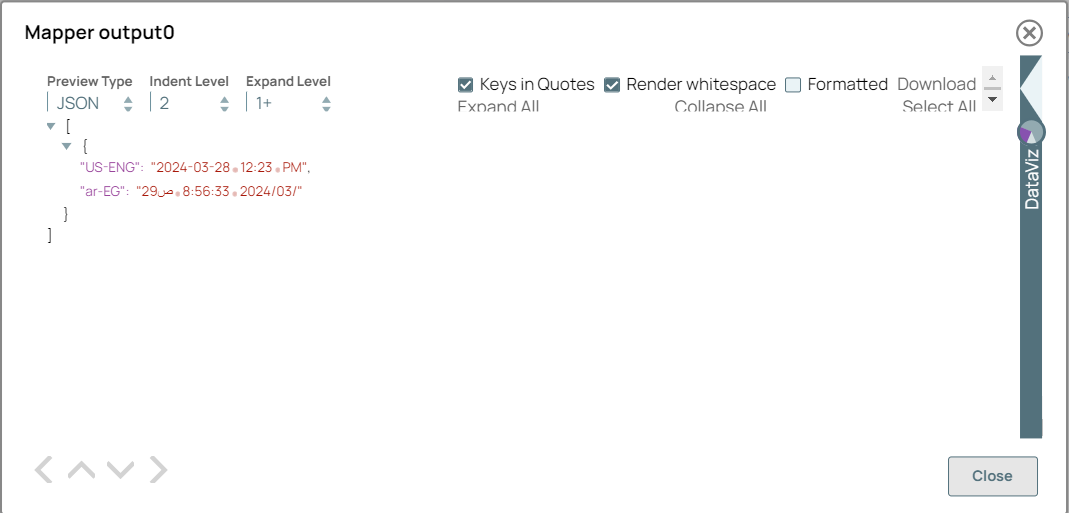In this Page
...
| Description | Parses a string representation of a date, and returns it as YYYY-MM-DDTHH:mm:ss.SSS that matches the server's timezone. The results are of the date-time data type. This is similar to the JavaScript parse. | ||
|---|---|---|---|
| Syntax |
This method has the following extensions from the standard:
| ||
| Example | Expression: Result: 2015-10-27T01:47:49.510 (in the server's timezone) Expression: Result: 2011-10-30T00:00:00.000 (in the server's timezone) Expression: Result: 2015-04-15T13:23:10.000 (in the server's timezone) Expression: Result: 2016-09-23T00:00:00.000 (in the server's timezone) |
...
| Description | This is similar to the JavaScript getTime - returns the numeric value corresponding to the time for the specified date according to universal time as the number of milliseconds since 1 January 1970 00:00:00 UTC (epoch time). | ||
|---|---|---|---|
| Syntax |
| ||
| Example | Expression: Date.now().getTime() Result: 1487712862069 |
getUTCDate
| Description | Converts the specified time to its corresponding UTC time. | ||
|---|---|---|---|
| Syntax |
| ||
| Example | Expression: Date.parse("2019-03-04T17:32:53.077").getUTCDate() Result: 4 |
...
| Description | Returns a string with a language sensitive representation of the time portion of this date. See Database Date Types for compatible date-related formats when data comes from a database. The argument to this method is an object containing the following options that control the format of the returned string:
This is similar to the JavaScript toLocaleDateTimeString. | ||
|---|---|---|---|
| Syntax |
| ||
| Example | Expression: Result: 2014 2024-0903-22T0029T00:00:00.000 Expression:
Date.now().toLocaleDateTimeString({"locale":"ar-EG"}) Result: For the {"timeZone":"zoneValue"} option, you can use the Canonical ID value from Joda-Time. Expression:
Result: |
...
toLocaleDateString
| Description | Format the date using the given format as described in an object. | ||
|---|---|---|---|
| Syntax |
| ||
| Example | Expression: 'JS_SomeFile' + Date.now().toLocaleDateTimeString({"format":"yyyyMMddhhmmss"}) + '.json' Result: JS_SomeFile20171106112401.json |
...
| Description | Returns a copy of this datetime with the specified duration added. This is similar to the JavaScript plus. | ||
|---|---|---|---|
| Syntax |
| ||
| Example | If Expression: Date.now().plus(2) Result: 2017-11-06T21:48:11.954 UTC (last digit increased by 2) Expression: Date.now().plus(20) Result: 2017-11-06T21:48:11.972 UTC (second to last digit increased by 2) Expression: Date.now().plus(2000) Result: 2017-11-06T21:48:13.952 UTC (fourth digit from the end increased by 2) |
plusDays
| Description | Returns a copy of this datetime plus the specified number of days. This is similar to the JavaScript plusDays. | ||
|---|---|---|---|
| Syntax |
| ||
| Example | If Expression: Date.now().plusDays(2) Result: 2017-11-08T21:48:11.952 UTC (day value increased by 2) |
plusHours
| Description | Returns a copy of this datetime plus the specified number of hours. This is similar to the JavaScript plusHours. | ||
|---|---|---|---|
| Syntax |
| ||
| Example | If Expression: Date.now().plusHours(2) Result: 2017-11-06T23:48:11.952 UTC (hour increased by 2) |
...


